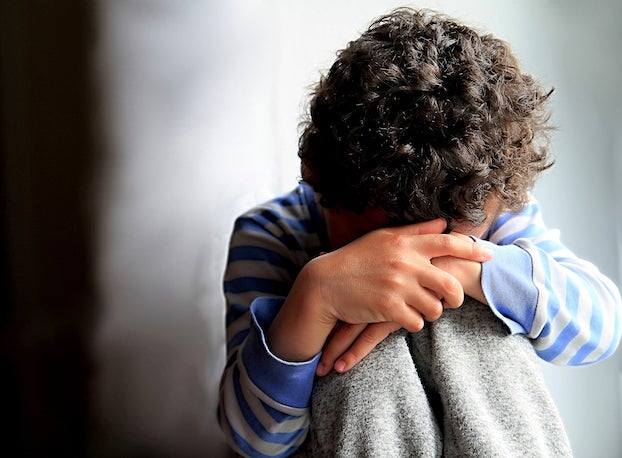Protecting the young and vulnerable: Family & Youth’s Children’s Advocacy Center stands as a champion for children
Published 12:57 pm Sunday, April 28, 2024

- Child abuse happens in all communities and with every socio-economic status, according to Patra Minix, director of the Children’s Advocacy Center. (Metro Creative Services)
April is Child Abuse Prevention Month and experts at Family & Youth are using this time as an opportunity to stress the importance of families and communities working together to prevent child abuse and neglect.
“We have to create awareness in order for the community to understand that there is an issue that’s happening,” said Patra Minix, director of the Children’s Advocacy Center. “Child abuse happens in all communities, every socio-economic status and in people with different backgrounds. People need to become aware not only to be able to recognize it but prevent it. That’s what we do.”
Family & Youth, established as a non-profit organization in 1970, is an umbrella organization that provides professional family services in Southwest Louisiana. Eight agencies work under that umbrella — Court Appointed Special Advocates (CASA), Human Services Response Institute, Children’s Advocacy Center (CAC), Performance Employee Assistance and Business Services, Children & Families Action Network, Autism Support Alliance and The Leadership Center for Youth.
“We serve everyone in our community, but we have a very heavy focus on our most vulnerable kids — those who have been abused or neglected,” said Michaelynn Parks, vice president of the organization. “We are those front-line people who get to be part of their lives in their most vulnerable moments.”
Minix said awareness is essential in preventing child abuse.
“There are many different indicators and, of course, it’s going to be case-specific and different for each child but a few that we see across the board are unexplained injuries — if a child has an injury and they’re unable to tell you how they received the injury — also any changes in a child’s pattern — eating, sleeping, school performance, or maybe potty training regression — and any changes in a child’s behavior.”
Minix, who trained as a CASA volunteer while in college, said she “absolutely loves children.”
“I love to serve in any capacity I’m able to serve my community and help children,” she said. “I remember taking the tour of the CAC my sophomore year and I remember seeing myself in the investigative chair and then four years later is when I started here.”
Minix said their team goes out into the community to talk about child abuse, how to recognize it and tools to prevent it. One of those tools is encouraging parents to teach the importance of body safety in an age-appropriate manner, particularly teaching children the correct anatomical names.
“It reduces that stigma that’s associated with it and it empowers the child,” she said.
Another tool is Internet safety.
“We have to monitor everything that our children are engaging in online — whether it’s a video game, their smart devices,” Minix said. “They’re interacting with the world so we want to make sure that we are monitoring that. Also, form connections and a trusting bond with your child. That is what is going to reduce their risk of being abused by a perpetrator.
The CAC, which is separate from the main Family & Youth building to main confidentiality, is designed to coordinate services for children who have been reported as sexually or severely physically abused.
Minix said the CAC provides a comfortable environment and well-trained staff who work together with area prosecutors, law enforcement agencies, child protection investigators, social service workers, therapists, victims’ advocates and medical professionals to investigate child abuse allegations and reduce the number of investigative interviews typically experienced by young victims.
“All of the interviews are recorded so that the child does not have to keep retelling their experience over and over again,” Minix said. “These interviews are fact-finding and non-leading and are used strictly for investigative purposes. We receive our referrals from child protection and law enforcement as well adult protective services, because we are trained to interviewed mentally delayed adults.”
They’re also trained to interview non-verbal children as well as those who are hearing-Impaired.
“As soon as they enter the door, the interview process begins,” she said. “We make sure to welcome them with a warm welcome and a snack or treats and we’ve partnered with Doctor Dogs so therapy dogs can come in to really reduce the stress of being in a new environment to come and tell about what they experienced.”
At the end of the interview, the child gets to choose a treat from the prize closet so the session ends on a positive note.
CASA Volunteers needed
Last year, the CAC conducted 592 interviews with children.
Parks said for community members with a heart for helping kids, CASA is in need of volunteers.
“We train them to advocate in the best interest of the child,” she said. “Oftentimes CAC is involved at the very beginning of a case when maybe there has been an allegation of abuse and neglect and they help law enforcement for the investigative piece, but after that a lot of times children enter into foster care and that’s where CASA comes into play.”
The CASA volunteer follows the child for the life of their case, ensuring they have everything they need to build resilience. Volunteers must be at least 21, pass a background check and have a heart to help.
All of the training is provided by Family & Youth.
“The volunteer would meet with the child at least once or twice a month, really connecting with them and creating that bond to help build resilience,” Parks said. “They also create court reports about every six months and give recommendations based on their fact-finding observations.
There are 27 CASA volunteers serving about 50 children in Calcasieu, Allen and Jeff Davis parishes. Nearly 120 children are still waiting to be assigned a volunteer. The majority of them are involved in neglect cases.
“If you’re wanting to give back, CASA is an amazing place to start,” Parks said. “We’re always in need of volunteers, especially those kids who are waiting for a voice. CASA gives hope to a lot of those kids — having a consistent person in their life who can help build that resiliency.”





